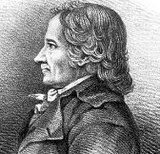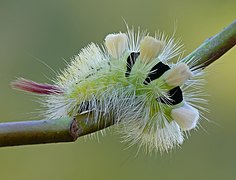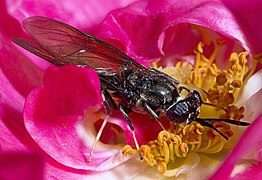Main Page: Difference between revisions
Faendalimas (talk | contribs) replaced call for species of the week per request |
Distinguished author. |
||
| Line 63: | Line 63: | ||
<div id=mf-da> |
<div id=mf-da> |
||
==Distinguished Author== |
==Distinguished Author== |
||
[[File: |
[[File:J. C. Fabricius (détail).jpg|right|160px]] |
||
'''[[ |
'''[[Johan Christian Fabricius]]'''<br>(1745–1808) |
||
<span style="font-size: 90%;"> |
<span style="font-size: 90%;"> |
||
A Danish zoologist, specialising in entomology. He was a student of Carolus Linnaeus in Uppsala (Sweden), and then appointed a professor at the University of Copenhagen (Denmark) as well as the University of Kiel (officially Germany, but ruled by the Danish king through a personal union). Fabricius is considered one of the most important entomologists of the 18th century, having named 9,776 species of animals, and established the basis for the modern insect classification. He added two distinct areas to the classification system: both artificial and natural characteristics. Artificial characteristics allowed for the determination of a species, and natural characteristics for the relationship to other genera and varieties. Much of his system still remains the basis of modern insect classification. Towards the end of his career Fabricius spent much of his time living in Paris, where he frequently met with naturalists such as [[Georges Cuvier]] and [[Pierre André Latreille]].</span> |
|||
A Portuguese zoologist and politician. He was the curator of Zoology at the Museum of Natural History in Lisbon. His work at the Museum consisted in acquiring, describing and coordinating collections, many of which arrived from the Portuguese colonies in Africa, such as Angola, Mozambique, etc. He published more than 200 taxonomic papers on mammals, birds, and fishes. In the 1880s he became the Minister of the Navy and later the Minister for Foreign Affairs for Portugal. The zoology collection at the Lisbon Museum is called the Bocage Museum in his honor. He was responsible for identifying many new species, which he named according to the naturalist who found them.</span> |
|||
</div> |
</div> |
||
<!--------------------------- Species of the week --------------------------> |
<!--------------------------- Species of the week --------------------------> |
||
Revision as of 21:24, 13 December 2015
|
Welcome to |
Taxon Navigation
|
Explore Wikispecies
Collaboration with ZooKeys A collaboration between Wikispecies and ZooKeys has been announced. PhytoKeys also joined the collaboration in November 2010. Images of species from ZooKeys and PhytoKeys will be uploaded to Wikimedia Commons and used in Wikispecies.
Distinguished Author Johan Christian Fabricius A Danish zoologist, specialising in entomology. He was a student of Carolus Linnaeus in Uppsala (Sweden), and then appointed a professor at the University of Copenhagen (Denmark) as well as the University of Kiel (officially Germany, but ruled by the Danish king through a personal union). Fabricius is considered one of the most important entomologists of the 18th century, having named 9,776 species of animals, and established the basis for the modern insect classification. He added two distinct areas to the classification system: both artificial and natural characteristics. Artificial characteristics allowed for the determination of a species, and natural characteristics for the relationship to other genera and varieties. Much of his system still remains the basis of modern insect classification. Towards the end of his career Fabricius spent much of his time living in Paris, where he frequently met with naturalists such as Georges Cuvier and Pierre André Latreille. |
|
Wikispecies is hosted by the non-profit Wikimedia Foundation, along with several other multilingual and free-content projects:
|









